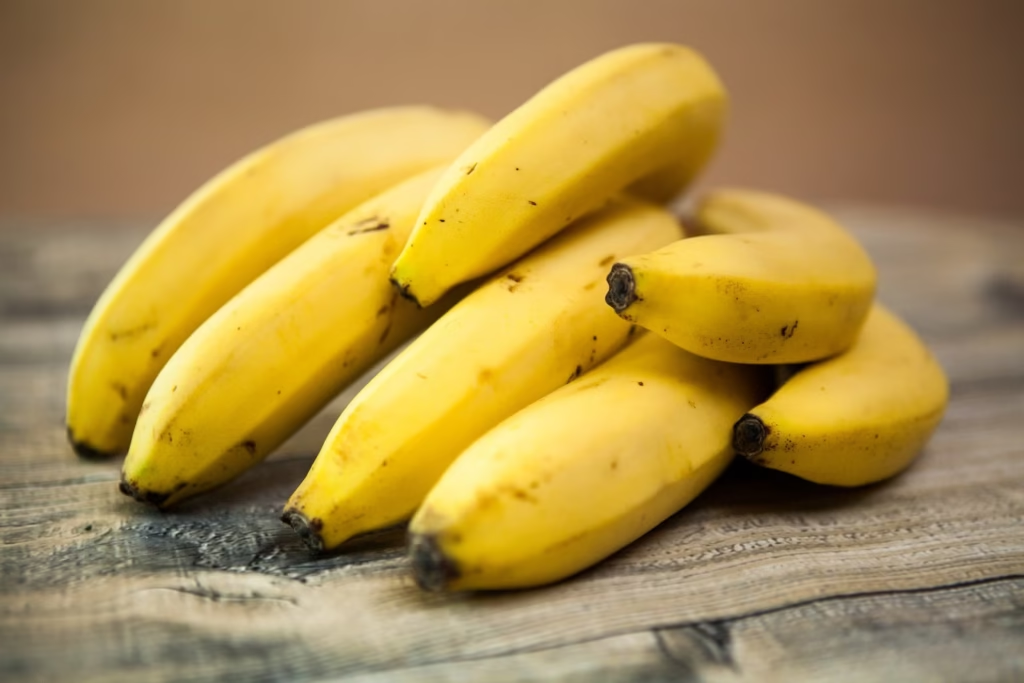The banana is one of the most popular and widely consumed fruits globally, loved for its natural sweetness, smooth texture, and convenience. Bananas belong to the genus Musa, and they are grown in tropical and subtropical regions around the world. They are not only an essential part of the diet for many, but bananas also serve as a source of income for millions of people in countries with warm climates. Known for their rich nutritional profile, bananas provide energy, vitamins, and essential minerals, making them a favored snack and an ingredient in various culinary dishes.

Origin and History:
Bananas are believed to have originated in Southeast Asia, specifically in the region that spans modern-day Malaysia, Indonesia, and the Philippines. Historical records show that bananas were cultivated as early as 5000 BCE, and they spread across Asia, Africa, and the Americas through trade and exploration. Today, bananas are grown in many tropical and subtropical countries, with the largest producers being India, China, and the Philippines.
Varieties:
Bananas come in different varieties, each offering unique flavor and texture. Some common types include:
- Cavendish Banana: The most widely cultivated and exported variety, characterized by its sweet taste and smooth texture when ripe.
- Plantain: A starchy, larger banana that is typically cooked before eating, often used in savory dishes.
- Red Banana: Smaller and with a reddish-purple skin, these bananas are sweeter and often eaten raw or used in desserts.
- Baby Banana: A smaller, sweeter banana, often eaten fresh or added to smoothies and salads.
Nutritional Value (per 100g of raw banana):
- Calories: 89 kcal
- Carbohydrates: 22.8g
- Dietary Fiber: 2.6g
- Sugars: 12.2g
- Protein: 1.1g
- Fat: 0.3g
- Vitamin C: 8.7mg (about 10% of the daily recommended intake)
- Potassium: 358mg (important for heart and muscle function)
- Vitamin B6: 0.4mg (important for brain health)
Health Benefits:
- Rich in Potassium: Bananas are a great source of potassium, a mineral that plays a key role in maintaining heart health, regulating blood pressure, and supporting muscle function.
- Provides Quick Energy: The high carbohydrate content, particularly natural sugars (fructose, glucose, and sucrose), makes bananas an excellent source of quick energy, making them a popular pre- or post-workout snack.
- Supports Digestive Health: The dietary fiber in bananas, particularly pectin, helps regulate bowel movements and maintain gut health. Bananas can help with both constipation and diarrhea.
- Promotes Heart Health: Along with potassium, bananas contain antioxidants such as dopamine, which help combat oxidative stress and inflammation, contributing to cardiovascular health.
- Helps in Weight Management: Bananas are relatively low in calories and are filling due to their fiber content, making them a good option for those aiming to manage their weight. The fiber helps with satiety, reducing the likelihood of overeating.
Culinary Uses:
Bananas are incredibly versatile in the kitchen, being used in a wide range of both sweet and savory dishes. Some common uses include:
- Raw Consumption: Bananas are often eaten raw as a snack or added to fruit salads, smoothies, or breakfast bowls.
- Baking: Ripe bananas are commonly used in banana bread, muffins, pancakes, and cakes.
- Fried or Grilled: Plantains, a starchy variety of banana, are often fried, grilled, or baked in various cultures, especially in Latin American, African, and Caribbean cuisines.
- Smoothies and Shakes: Bananas add natural sweetness and creaminess to smoothies and milkshakes.
- Frozen Treats: Bananas can be frozen and blended into a creamy, ice cream-like consistency as a healthy alternative to traditional ice cream.
Storage:
Bananas should be stored at room temperature to ripen. Once ripe, they can be refrigerated to slow the ripening process, although the skin may darken. If you have overripe bananas, they can be frozen for later use in smoothies or baking. Plantains, on the other hand, should be stored at room temperature until they reach the desired level of ripeness for cooking.
Fun Facts:
- Bananas are technically classified as berries, despite their appearance.
- The banana plant is a giant herb, not a tree, as its “trunk” is a pseudostem made of tightly packed leaves.
- The “banana peel” is often discarded, but it contains several nutrients and antioxidants and can be used in smoothies or even as a meat tenderizer.
- In many cultures, bananas have cultural and spiritual significance, appearing in folklore, art, and ceremonies.
